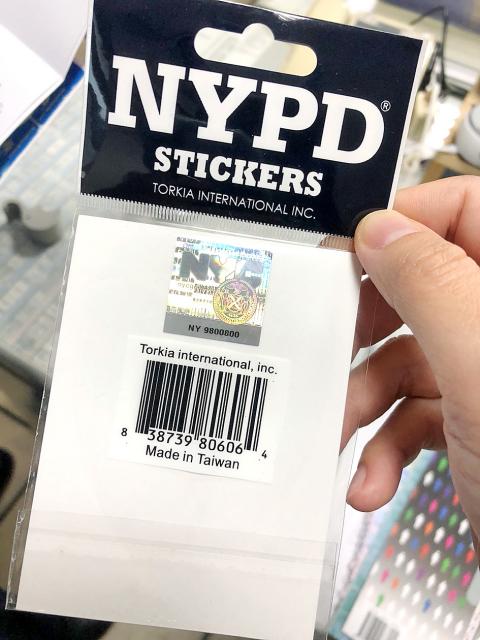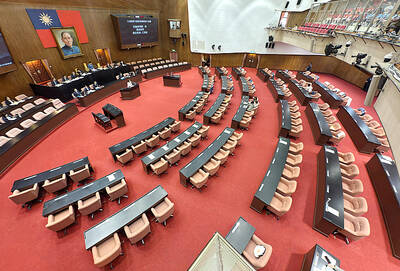President Tsai Ing-wen (蔡英文) yesterday spoke out against a proposal by Kaohsiung Mayor Han Kuo-yu (韓國瑜) to establish a free economic zone in the city, saying it could cause Chinese goods to be mistaken for Taiwanese goods.
If a free economic zone made it unclear whether US-bound goods were Taiwanese or Chinese, the effect on Taiwan from the US-China trade dispute would be greater than elsewhere, so the government is opposed to a free economic zone, Tsai said.
The US-China trade dispute could affect the entire global economy if not reined in, she said.

Photo: Wang Chieh, Taipei Times
Trump on Sunday said that he was considering increasing tariffs on US$200 billion of Chinese goods in response to slow negotiations.
The government was constantly preparing response measures to changes in the global economy, Tsai said.
The most crucial task would be to encourage Taiwanese businesses to bring production back to the nation so that it could export more Taiwanese goods, not Chinese goods, she said.
This would be the best way to avoid high tariffs imposed on China by the US, she said.
Bringing Chinese goods into Taiwan through a free economic zone would tie Taiwan to China’s economy and turn Chinese goods into Taiwanese goods, she said.
“Just as the US-China trade dispute is heating up, there are actually politicians who want to import Chinese tea and process it here so that it becomes ‘Taiwanese tea,’” Tsai said.
Doing so would harm the good reputation that Taiwanese products have and invite retaliation from the US, she said.
Taiwanese would not accept such a scenario, she said.
Taiwan has expanded production and demand for local products domestically and globally, she said, adding that to set up a free economic zone would be a step backward.
Separately yesterday, Han said he was happy to see the issue of free economic zones being discussed.
If the Executive Yuan is planning to promote the idea, he hopes they would “prioritize Kaohsiung and give the city a chance,” Han said at a Kaohsiung City Government question-and-answer session.
His hope was to increase competitiveness by lowering tariffs, and easing restrictions would help accomplish this, he said.
Concerns about Chinese goods being confused for Taiwanese goods were just “one angle,” Han said, adding that the government should test the idea in Kaohsiung.
Although his comments regarding free economic zones might differ from the ideas of economists, hopefully the Executive Yuan would “give Kaohsiung a chance,” he said, adding that he hopes the city would “turn over a new leaf” economically by implementing the idea.

CROSS-STRAIT COLLABORATION: The new KMT chairwoman expressed interest in meeting the Chinese president from the start, but she’ll have to pay to get in Beijing allegedly agreed to let Chinese Nationalist Party (KMT) Chairwoman Cheng Li-wun (鄭麗文) meet with Chinese President Xi Jinping (習近平) around the Lunar New Year holiday next year on three conditions, including that the KMT block Taiwan’s arms purchases, a source said yesterday. Cheng has expressed interest in meeting Xi since she won the KMT’s chairmanship election in October. A source, speaking on condition of anonymity, said a consensus on a meeting was allegedly reached after two KMT vice chairmen visited China’s Taiwan Affairs Office Director Song Tao (宋濤) in China last month. Beijing allegedly gave the KMT three conditions it had to

‘BALANCE OF POWER’: Hegseth said that the US did not want to ‘strangle’ China, but to ensure that none of Washington’s allies would be vulnerable to military aggression Washington has no intention of changing the “status quo” in the Taiwan Strait, US Secretary of Defense Pete Hegseth said on Saturday, adding that one of the US military’s main priorities is to deter China “through strength, not through confrontation.” Speaking at the annual Reagan National Defense Forum in Simi Valley, California, Hegseth outlined the US Department of Defense’s priorities under US President Donald Trump. “First, defending the US homeland and our hemisphere. Second, deterring China through strength, not confrontation. Third, increased burden sharing for us, allies and partners. And fourth, supercharging the US defense industrial base,” he said. US-China relations under

The Chien Feng IV (勁蜂, Mighty Hornet) loitering munition is on track to enter flight tests next month in connection with potential adoption by Taiwanese and US armed forces, a government source said yesterday. The kamikaze drone, which boasts a range of 1,000km, debuted at the Taipei Aerospace and Defense Technology Exhibition in September, the official said on condition of anonymity. The Chungshan Institute of Science and Technology and US-based Kratos Defense jointly developed the platform by leveraging the engine and airframe of the latter’s MQM-178 Firejet target drone, they said. The uncrewed aerial vehicle is designed to utilize an artificial intelligence computer

The Chinese Nationalist Party (KMT) caucus yesterday decided to shelve proposed legislation that would give elected officials full control over their stipends, saying it would wait for a consensus to be reached before acting. KMT Legislator Chen Yu-jen (陳玉珍) last week proposed amendments to the Organic Act of the Legislative Yuan (立法院組織法) and the Regulations on Allowances for Elected Representatives and Subsidies for Village Chiefs (地方民意代表費用支給及村里長事務補助費補助條例), which would give legislators and councilors the freedom to use their allowances without providing invoices for reimbursement. The proposal immediately drew criticism, amid reports that several legislators face possible charges of embezzling fees intended to pay